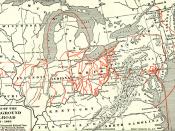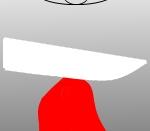Pro Dystopia
"I want everything back, the way it was. But there is no point to it, this wanting" (122). This is the desire of Margaret Atwood's central character Offred in The Handmaid's Tale. The novel is set in the near future in the Republic of Gilead which is formally the United States of America. Placing the blame on Islamic fanatics, a right-wing extremist movement guns down the president along with the congress, and takes total control of the government. Within days, citizens namely women, begin to realize that their freedoms are being taken away. The United States is transformed into an American dystopia full of environmental pollution, state supervision and Puritanical fundamentalism. With this transformation, comes a transformation of the way citizens are accustomed to live. Families are ripped apart and taken to different locations in the regime. They are either used as a "resource" for the betterment of society or killed.
In this case, Offred is sent to a school to be re-educated about her new life and the responsibilities that come with it. She is then sent to a house to be a handmaid whose only functions are to go to the market and buy the food daily and to, most importantly, produce children for the Commander and his wife whom she is staying with. So begins the story of the handmaid Offred with whom the reader connects and goes along with on a journey of personal growth. The Handmaid's Tale presents delicate issues that may be unsuitable for immature audiences. Topics of sex, oppression, social and political reorganization along with gender hierarchy prove to be too challenging or too explicit for younger audiences. Although it is right to challenge The Handmaid's Tale for children that are not yet in high school, it proves to be an...


